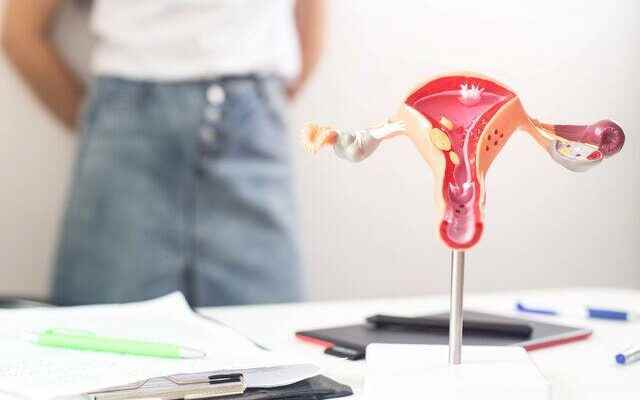Is it good or bad to have many eggs in women with polycystic ovaries, is the number or quality of eggs important? Gynecology, Obstetrics and IVF Specialist Prof. Answers to the confusing questions about polycystic ovary syndrome. Dr. Gökalp Öner gave:
In our IVF treatments, PCOS (polycystic ovary syndrome) is the group that our expectant mothers do not like at all, but our favorite group. First of all, it is seen in one out of 10 women in the world, and in our country, this syndrome is a chronic disorder with a prevalence of 20%, that is, we see it in one out of every five women. In other words, a woman is born with this syndrome already in her mother’s womb. Women of reproductive age often come to us with complaints such as menstrual irregularity, hair growth and rapid weight gain.
Polycystic ovary appearance in the ultrasound we do in women who apply or it is noticed in hormones, especially when AMH, that is, ovarian reserve is higher than four. In addition, additional diseases such as goiter or high milk hormone should be excluded, as these diseases can be confused with PCOS. In a woman, ovulation does not occur in the 14 days before menstruation. Therefore, the period of conception can be calculated by subtracting 14 days from the total cycle and not including the menstrual period. A woman who menstruates every 28 days ovulates in the first 14 days, while a woman who menstruates once in 35 days ovulates in the first 21 days. Since ovulation will not occur during menstruation, a relationship is recommended between the end of menstruation and 14 days before the next menstruation. Pregnancy often comes spontaneously when the sperm fertilizes this cracked egg.
IT IS THE FAILURE OF EGGS
Saying, “The number of eggs in women with polycystic ovary appearance is much higher than the normal number,” said Prof. Gynecology, Obstetrics and IVF Specialist. Dr. Gökalp Öner said, “Under normal conditions, we consider 8-12 eggs as a normal number in a woman, but with our women with PCOS, this number is based on serious numbers. So much so that I know that I collected 117 eggs. Despite having such a large number of eggs, this is the situation where the eggs cannot be cracked. Unfortunately, we may not be able to see the pregnancy situation in these couples because of PCOS and therefore the eggs cannot fertilize the sperm.
MEDITERRANEAN DIET IS RECOMMENDED
In polycystic ovary syndrome, this number of eggs is accompanied by menstrual irregularity. We recommend our women and girls who come to us with PCOS to lose 10 percent of their weight first. Because as I mentioned, rapid weight gain is one of its most visible features. We often observe that with weight loss, egg quality increases five times. We especially recommend the Mediterranean diet. Then we recommend folic acid and vitamin D supplements. These supplements are important, as we see vitamin D deficiency in most of our women with PCOS. Again, we see sugar resistance in many of our PCOS group women. In our women in this group, we start sugar resistance regulating medication. This is our indispensable pre-treatment model for our couples who come for a child request and all women with PCOS syndrome. Of course, 80 percent of our couples who come for a child request, whose diagnosis of PCOS is revealed by examination and tests, and for which we plan our pre-treatment, respond positively to this treatment and our natural pregnancy occurs spontaneously. However, there is also 20 percent of this group, which unfortunately cannot respond positively to our treatment. After this process, we go to the egg follow-up, which is our second stage, we grow the eggs with drugs and crack them, if the sperm values are good and the tubes are open, we recommend intercourse. We can often get pregnant again within six months. In this way, we start in vitro fertilization treatment for our group, for whom we could not get a response and could not get pregnant. There is no such thing as a shortage of reserves, which really requires a very tiring and grueling treatment. In other words, we have plenty of eggs from which to obtain embryos. All we have to do is apply our treatment that will make these eggs even better. Then, when we combine the eggs we collect with our sperm, which we have made better with our treatment, under the best laboratory conditions, we transfer our best quality embryo on the fifth day.
IVF HIGH CHANCE OF SUCCESS IN PEOPLE WITH PCOS
‘Sir, why do you do in vitro fertilization without trying vaccination?’ Gynecology, Obstetrics and IVF Specialist Prof. Dr. Gökalp Öner explained this with these words: “There is no point in vaccinating couples with normal sperm count anyway. Because the purpose of vaccination is to transmit the sperm, which is slow in speed and less in number, to the egg in this way. In addition, we do not want our expectant mother to experience a situation such as OHSS, that is, overstimulation of the egg. Likewise, the drugs we give can overstimulate the eggs. When all the eggs are overstimulated and enlarged, that abdomen collects fluid and fills the abdomen with fluid up to the lungs. And we don’t want that to happen. IVF helps us a lot at this point. The wonderful beauty of embryo freezing and giving us the chance to mature eggs with a needle that will not cause OHSS gives us the opportunity to suppress these overstimulated eggs. In this way, we perform our in vitro fertilization procedure without experiencing OHSS in most of our mothers with PCOS. That’s why PCOS syndrome is our favorite group in IVF treatment. Our chances of success will be very high when we apply it to our couples who have not received a response to our pre-treatment and egg follow-ups.”
